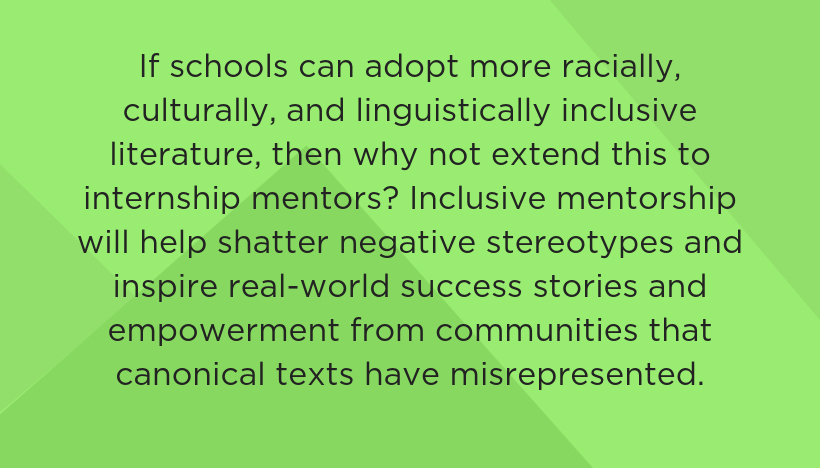From the NCTE Committee Against Racism and Bias in the Teaching of English.
This blog was written by Holly Spinelli and Richard Gorham, members of the NCTE Committee Against Racism and Bias in the Teaching of English.
In recent years, more schools across the United States have adopted internship and experiential learning opportunities for students. Local businesses, nonprofit organizations, and mentors partner with school districts to provide students with hands-on learning and practical application of the skills students acquire.
In many cases, English teachers are tasked with guiding students through their internship process, especially in the case of writing, researching, and preparing final presentations and portfolios.
As educators, we know that students are often more engaged and focused if they find value in lessons that impact their lives beyond a classroom’s four walls, however, education systems are quick to look at attendance rates, graduation statistics, and GPAs when assessing experiential partnerships with schools. While those data are important to consider, how many school districts view the experiential learning model as an excellent opportunity to break social, cultural, linguistic, and racial barriers?
Apprenticeship and internship models have questionable historical roots, rampant with racially-charged agendas. Consider the controversial Hampton-Tuskegee Model. Its design perpetuated the “separate but equal” sentiment in educating people of color during the Reconstruction Era, as it kept this population in the low-skill labor force.
This bias carried through our modern educational systems, and in some spaces, it persists during discussions of apprenticeship and trade programs in schools. The current wave of college preparatory models in education paid lip-service to the value in apprenticeship and experiential learning models, until ways were found to connect internships with college pathways. This split began in the mid-twentieth century when internships and apprenticeships served students pursuing trades and undergraduates seeking opportunities to break into their chosen career fields.
Today, students as young as 13 years old participate in internship opportunities in a variety of fields—from summer writing internships to assisting engineers. The bias against internships as an avenue to low-skill labor jobs is diminishing. A lot has changed, and thankfully, much of it is positive.
It is important for young people to find and cultivate their passion for learning in a specific area, but how many of these opportunities offer students chances to learn with and from people whose culture and linguistic backgrounds differ from their own?
The popularity and demand for experiential learning is increasing, and the number of opportunities for students to engage with entrepreneurs, professionals, non-profit directors, and mentors is growing, too. As such, schools can and should do all that they can to extend these learning experiences to include anti-racist and anti-bias practices.
If a school’s population is mostly white and middle-class, and the school plans to implement an internship program, an important component to consider is reaching beyond what students already know and experience in their daily lives.
Schools can do this by actively forging partnerships with entrepreneurs, nonprofits, mentors, professionals, and business owners of color within and beyond their immediate locale. An inclusive experiential education model with people of color in positions of power can bridge cultural and linguistic barriers. The benefits of more inclusive internship partnerships extend well beyond the student earning an A or completing an exemplary final portfolio or presentation.
First, students of color will have opportunities to learn and grow from respected, knowledgeable mentors of color. They will see themselves in their mentors’ success. Students of color not only deserve, but have the fundamental right, to see their cultural and linguistic backgrounds represented beyond literature and history lessons that exist in the classroom’s four walls.
These students will gain access to a larger network that supports people of color in their professional endeavors. They can, in turn, become mentors for future students, thus adding to and strengthening professional pathways for students of color. Second, white students will have opportunities to learn valuable lessons from people of color in positions of power. This can shatter society’s stereotypical image of professionalism: a successful white male. Unfortunately, this single image is one students are groomed to accept.
Consider this: if a high school English curriculum follows a traditional approach with western canonical texts, students are largely exposed to stories that present women, people of color, and other marginalized groups as uneducated, second-class citizens, and in some cases, the monstrous villains who the white protagonist must tame or defeat.
At worst, they are absent, and therefore, invisible. Unless these images and ideas are challenged, students are presented with biased narratives that devalue people from marginalized communities.
If schools can adopt more racially, culturally, and linguistically inclusive literature, then why not extend this to internship mentors? Inclusive mentorship will help shatter negative stereotypes and inspire real-world success stories and empowerment from communities that canonical texts have misrepresented.
Furthermore, white students will learn to navigate and adapt to professional environments with linguistic diversity. They will learn that English is not always the dominant language of communication. They will experience a professional environment where positive decision-making and successful business practices are conducted in languages other than English.
In turn, this can combat linguistic bias and foster the students’ empathy and understanding for English language learners in their own classrooms and larger communities. These opportunities can cultivate cross-cultural communication and mutual respect, which will offer students pathways to worlds that they may not have previously explored if they remained in programs and areas that reflect what they already know.
To be truly successful, experiential learning programs must include a reflection component through which students can process their learning and engage with each other in deconstructing power relationships informed by race, class, gender, language, and (dis)-ability. Students who engage in experiential learning combined with thoughtful reflection can learn to negotiate systems of power, and will be more likely to emerge as leaders in creating inclusive workplaces as they move into the workforce.
There are countless, far-reaching anti-bias benefits to internship and experiential learning partnerships in schools, and one that must not be overlooked is the opportunity to value mentorship and success from previously marginalized groups.
Schools with inclusive internship partnerships will decolonize students’ real-world learning experiences and create more socially, racially, culturally, and linguistically inclusive learning experiences that benefit all participants.
Recommendations for Anti-Racist Service Learning Initiatives:
- Prior to students starting an experiential learning project, have them write about experiential learning projects they want to explore. Similarly, reach out to local business owners, entrepreneurs, and nonprofit directors who agree to partner with your school to do the same.
- Require students and potential business owners, entrepreneurs, or nonprofit directors to expand upon the “why” or the rationale for their selection. If you see “to add to my resume” or “because it will look good on my college application,” or “because free labor helps my business financially,” take time with your student and mentors to review foundational concepts of “experiential learning.”
- Pair students with local business owners, entrepreneurs, or nonprofit directors who share experiences that will not only match your students’ interests, but also expose students to a local area, a group of people, or an approach to learning that differs from those with which the student is already familiar.
- Host a small meeting with the student and the experiential learning mentor PRIOR to the start of the experiential learning experience. Have all parties involved discuss, review, and agree upon expectations, goals, and outcomes.
- Engage students in reflective journaling and discussion before they begin the experiential learning placement. Encourage questions such as:
- “what are my goals?”
- “what are the systems of power I will negotiate?” and
- “what has surprised me?”
- If possible, visit your student at the experiential learning site on multiple occasions (in the beginning, the middle, and the end of the experience) and ask the student and the mentor to discuss what and how learning is taking place at the site.
- Consider the end goals. What do all involved with the experiential learning hope to accomplish and achieve? Take time to review and reflect: Were all goals achieved? If so, how? If not, what can be done to improve the process?
Sources
https://www.educationdive.com/news/more-districts-creating-high-school-internship-programs/504605/
https://educate.bankstreet.edu/cgi/viewcontent.cgi?article=1108&context=occasional-paper-series
 Holly Spinelli is an advocate for equality in classrooms with specific focuses in alternative, strengths-based pedagogical practices where students’ voices serve as the catalyst for their education. She is a public high school educator in New York, and her pedagogical approaches include anti-racist, anti-bias, and anti-oppression facilitation.
Holly Spinelli is an advocate for equality in classrooms with specific focuses in alternative, strengths-based pedagogical practices where students’ voices serve as the catalyst for their education. She is a public high school educator in New York, and her pedagogical approaches include anti-racist, anti-bias, and anti-oppression facilitation.

Richard Gorham is an English teacher at Lawrence (MA) High School, and a member of the Bread Loaf Teacher Network.

